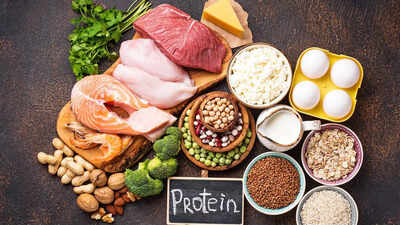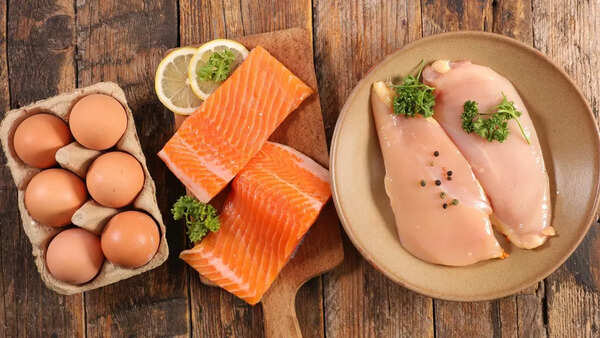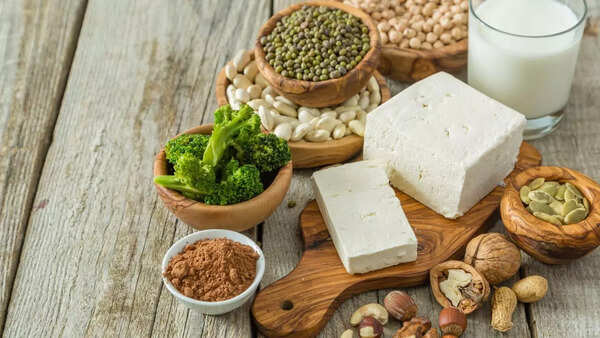
Proteins are crucial for building, repairing, and maintaining tissues, as well as facilitating various cellular functions. But everything is good only when consumed in limits.
Despite the popularity of protein-rich foods and supplements, experts say most people already consume sufficient protein through their diet. Rather than relying on supplements for extra protein, focusing on balanced eating habits and regular exercise is a more effective way to achieve overall health. The widespread marketing of “high-protein” products can create unnecessary concern about protein intake. Still, according to experts, a varied diet provides enough daily calories and typically meets protein needs.
Why is protein important?
Proteins are fundamental components of every living cell, serving both structural and functional roles that support life’s essential processes. Proteins are composed of amino acids, the fundamental building blocks that support various functions. While the body can produce some amino acids, essential amino acids must be obtained through diet. As a macronutrient, protein is one of the three key nutrients, alongside carbohydrates and fats, necessary for overall health. Protein plays a critical role in:

Source: Canva
- Building and repairing muscles- Maintaining strong bones- Healing wounds- Supporting healthy skin, hair, and nails
How much protein is too much protein?
While a relatively high protein intake is generally safe, consuming extremely large amounts may be unnecessary and potentially harmful.
Protein deficiency is relatively rare and typically affects individuals with malnutrition or those in low-income areas with limited access to food.According to the World Health Organization (WHO), healthy adults require about 0.8 grams of protein per kilogram of body weight daily.- Approximately 50 grams of protein per day for an average woman (65 kg / 143 lbs)- About 60 grams of protein per day for an average man (75 kg / 165 lbs)However, protein intake of every individual varies; physically active people, and especially strength athletes, require more protein.
Animal and plant-based sources of protein:
Animal-based sources are considered complete proteins, providing all essential amino acids, and often come with additional nutrients like iron and zinc.

Source: Canva
- Meat, fish, and poultry
- Eggs
- Dairy products (milk, yogurt, cheese)
While plant-based sources may not always provide all essential amino acids in one food, consuming a variety of plant proteins throughout the day can meet your protein needs.

Source: Canva
- Legumes (beans, lentils, chickpeas, peas)
- Soy products (tofu, tempeh)
- Quinoa
- Nuts and seeds
What if you’re a vegetarian?
Vegans or vegetarians may have a slightly lower protein intake compared to non-vegetarians.
But, they can still meet their protein requirements with the right food choices. Including a variety of plant-based protein sources in your diet is the key.

Source: Canva
These include:
- Legumes
- Tofu
- Nuts and seeds
- Whole grains
Additionally, vegetarians can get protein from dairy products also.
Signs you’re overdoing protein:
You can observe the following symptoms to check if you’re overdoing protein:
- Constant thirst
- Frequent urination
- Digestive discomfort
- Bad breath
How to balance your protein intake
1. Meet your daily protein intake: Aim for 0.8 to 1 gram of protein for every kilogram of body weight daily.2. Eat protein from a variety of sources: Particularly look to choose more animal-based protein foods (meat, fish, eggs, dairy) and a variety of plant-based (legumes, beans, lentils, tofu).3. Don't consume your protein all at the same time: Split your protein consumption between your meals and snacks.4. Your protein intake depends on the individual needs (age, sex, weight, exercise level, fitness goal).5. Combine your proteins with other nutrients: Look for balance with protein, carbohydrates, other nutrients, and fat.6. Stay hydrated: Being hydrated helps with digestion and the use of protein.Seek personalized protein intake advice from a registered dietitian or healthcare professional.

 5 hours ago
47
5 hours ago
47




























 English (US)
English (US)